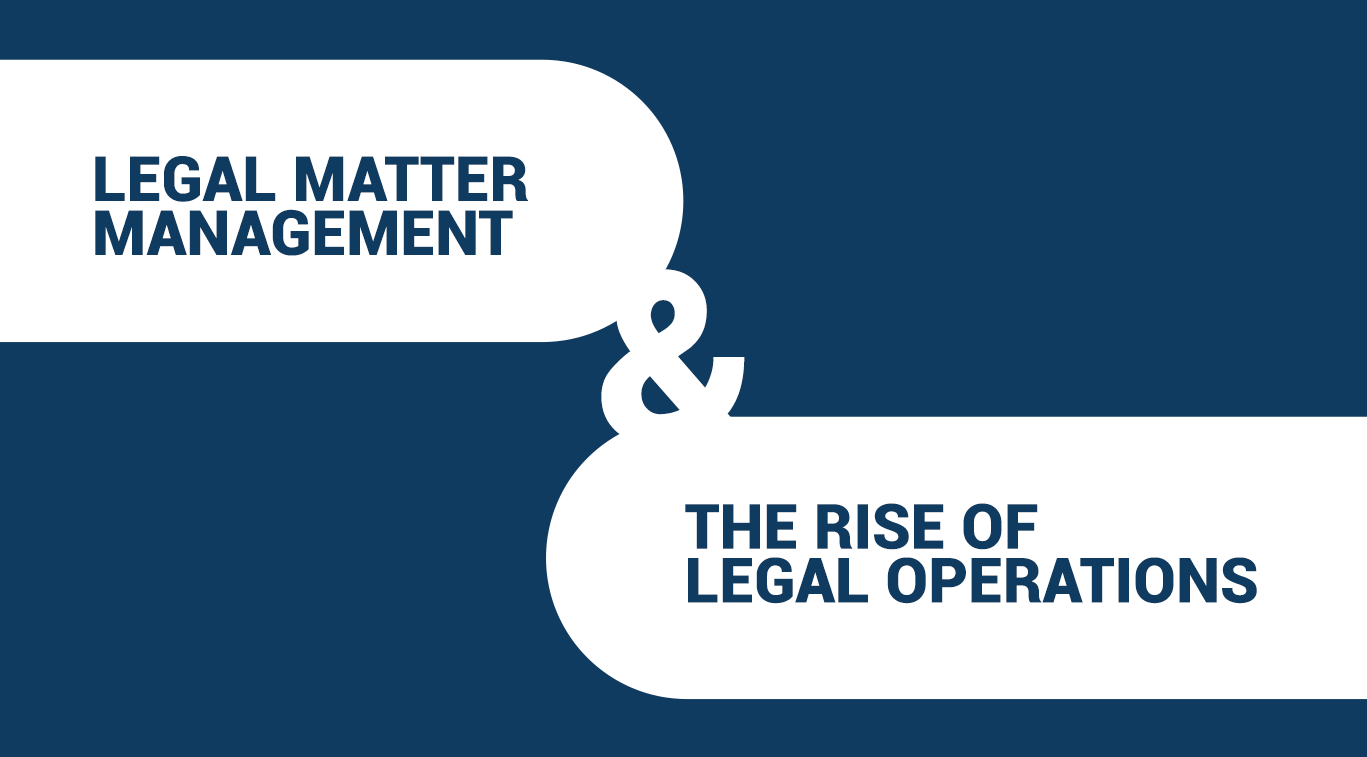Legal Matter Management & The Rise of Legal Operations

Written by Maryam Khan
Blogger

Legal operations play a crucial role in a law firm’s strategic and business development. Law firm management and General Counsel are now forming legal operations teams to whom management tasks are delegated, similar to how any other business unit is managed. Legal operations involve identifying opportunities to maximise productivity, streamline processes, and focus on creating value while keeping costs low [1].
Keeping costs low involves investing in the right tools and resources to ensure long term profitability and process efficiency. Here is where the role of legal matter management systems comes into play. Gartner, a technology research and consulting company, states that ‘legal matter management can optimise, even transform, core legal operations, while providing a basis for other investments in legal technology’ [2]. Matter management systems software supports legal operations teams and acts as the cornerstone of an in-house legal team or a law firm’s successful matter management [3].
What is legal matter management?
Legal matter management refers to all aspects of managing and operating a legal practice, both internally and externally [4]. It is completely different from case management which deals with large document reviews, case bundles and heavy litigation. Legal matter management is a more comprehensive system encompassing a broad range of activities. It involves the collection, storage and organisation of the firm’s data relating to the management of a particular matter and the firm’s collective matters. These details refer to the type of legal work being carried out, the lawyers working on a particular case, the witnesses, the judges, and the budget and invoices related to the case [5].
It manages all activities relating to the full life cycle of a legal matter. This again includes issue management, contract lifecycle management, knowledge management, outside counsel management and team performance management [6]. Such software incorporates features that make firm-wide operations more seamless in terms of assigning lawyers and timekeepers to a case, reporting on the progress of the case and efficiently opening and closing legal matters, to name a few [7].
What does ‘legal matter’ include?
Legal matter management streamlines the process of dealing with a legal matter. Such systems incorporate various aspects of the firm in a centralised system to increase efficiency and collaboration. Legal matters include documents, knowledge relating to the delivery of a legal matter, the different stakeholders involved in a case, the process of opening and closing a case, distribution of work relating to the case, spend management and reporting [8]. Legal matter management software simply facilitates the organisation and delivery of all these core components of an ongoing legal matter.
What operational challenges are law firms currently facing
Dependency on Manual Data Processing
Excel spreadsheets, folders, paper documents and filing cabinets are examples of outdated manual processes. When law firms and in-house legal departments rely on these processes to carry out their work, they are doing themselves a disservice by simply adding more work onto their plate. Manual data entry, due diligence, and document storage are extremely tedious and time-consuming. It is also prone to human error, which can cause severe delays in a law firm’s operations. Examples of such delays include not finding an urgent document simply because a junior employee dated the document incorrectly.
Lack of Standardised Tools
A major issue faced by law firms and in-house legal departments is a lack of standardised legal technology tools available. As a result, law firms have to invest in separate technology and productivity tools for their internal and external matters. This is an additional cost, but it severely hinders cross-team collaboration and hinders visibility [9]. Lastly, as the firm’s data is not being processed through one system, legal data analytics features within these tools do not work as effectively as they lack broader firm-wide information that provides a more in-depth insight into the firm’s performance.
Security Risks & Concerns
Law firms and in-house legal teams may open themselves up to significant risk if they do not have standardised security measures in place when dealing with confidential information [10]. Suppose there is no centralised document storage system. In that case, there are fewer access control restrictions, and it becomes difficult to locate documents, manage controls and organise large volumes of data across several systems.
Information Silos
An information silo refers to a law firm’s existing information management systems that do not communicate with other systems within the firm [11]. Not only does this severely hinder communication, but it also impacts different systems from collaborating, resulting in repetitive tasks and the matter at hand taking longer to complete. These silos prevent teams from accessing updated information and restrict shared responsibility and understanding of the firm’s projects [12].
How can legal operations teams benefit from matter management software?
Improved Client Service
Legal matter management software includes a feature that allows clients to access a self-service portal to keep up to date with their matters. Clients receive automated notifications powered by artificial intelligence on updates relating to their matter [13]. This allows for transparency and ensures consistent communication between the law firm and its clients. Clients no longer have to send emails to their lawyers asking for an update which can often leave them dissatisfied if they do not receive a prompt response.
Automated Administration, Invoicing & Billing
Legal matter management software automates certain administrative tasks that can be quite repetitive and tedious. The software’s automated invoicing and legal pricing analytics features eliminate the risk of human error and allow the firm to use its time better. Other features like billing guidelines, invoice review and counsel collaboration ensure that fewer manual processes are involved, reducing the likelihood of any invoicing errors [14].
Greater Efficiency Through Standardization
Standardised processes have a positive effect across law firms and in-house legal departments. Providing a centralised and standardised system to record matter activity is a legal matter management software’s primary function. Having one system that stores all deadlines, documents and records accurately and securely make the entire operations process more efficient and streamlined [15]. Having a standardised process ensures smooth operations and motivates lawyers to work more efficiently as there is a better organisation and fewer operational delays. Lastly, standardised systems allow for documents to be edited in real-time or changes made to be tracked which maintains a high level of transparency within the organisation and allows lawyers to have immediate access to updated documents [16].
Increased Security & Data Protection
Maintaining confidentiality is crucial for law firms. Legal matter management software ensures that all legal matters and contact points are kept secure and centralised. The software includes access management and control features which put restrictions on who can access files and how they can be shared. This is key to maintaining confidentiality as files are only shared on a need-to-know basis which is extremely important for high profile cases. The software’s legal document security features and protocols save firms from any catastrophic data breaches that could disadvantage the client and damage the firm’s reputation..
Greater External & Internal Collaboration
Legal matter management software facilitates collaboration through task ownership and co-ownership features [17]. Additionally, there are features where notifications can be sent to an employee regarding outstanding matters, upcoming deadlines or any work-related updates. Other ways in which collaboration is improved is through increased communication and alignment with external counsel. Legal matter management systems ensure that external counsel is instructed clearly and concisely and are provided with the best tools to collaborate with their clients [18]. These features enable successful collaboration and client-lawyer engagement, improving transparency, productivity, and communication [19].
Empirical Data Collection, Analytics & Insights
The legal sector is now far more data-driven than before and the importance of data analytics in the legal industry is unmatched. Law firms and corporate legal departments are heavily dependent on empirical data collection, data analytics and insight generation tools to identify patterns within the firm’s structure to spot strengths and weaknesses. Legal matter management software deals with vast amounts of data configured to deliver data-rich reporting and analytics on specific attributes selected by each firm [20]. Legal matter management software’s data analytics features generate valuable insights that law firms use to inform their strategy and business.
More Transparency Through Improved Compliance & Reporting
Staying on top of the changing regulatory environment and new compliance requirements is a law firm’s key priority in light of the socio-economic impact of the Covid-19 pandemic in Brexit. Legal matter management software ensures that all information associated with a legal practice is stored and regularly updated. Features included within the software offer ‘out of the box’ reporting alongside customisable insight. Out of the box reporting surfaces views on risk, current urgent matters at hand, waiting times for ongoing matters and the overall workload efficiency [21]. Such insights provide an overview of the firm’s performance and increase transparency within legal operations. Lastly, when clients demand greater transparency in the legal sector, investing in legal matter management solutions allows legal departments to meet their clients’ expectations whilst increasing their efficiency.
Higher Revenue & Cost Savings
Every legal practice has to cut costs, allocate resources efficiently and generate more value to thrive in a competitive legal market. Legal matter management software enables legal teams to manage their expenses better, seamlessly access and share firm-wide knowledge, work collaboratively and communicate effectively. Such an investment allows law firms to leverage workflows to improve productivity, efficiency and profitability. Additionally, the automated spend management features allow firms to reduce their capital expenditure and increase productivity to avoid losing revenue [22].
Final Words
A successful, growing law firm interested in expanding further can only do so with the help of legal technology, efficient law firm operations software and firm-wide matter management. Law firm management now understands the impact of efficient legal operations and delegates that function to specific professionals. The last thing both clients and law firms want is their lawyers to get caught up in operational tasks instead of providing legal advice.
References
[1]’The Rise of Legal Operations’, Legal Briefing, In-House Lawyer (2019) at https://www.inhouselawyer.co.uk/legal-briefing/the-rise-of-legal-operations/
[2] Enterprise Solutions, ‘Matter Management’, LexisNexis at https://www.lexisnexis-es.co.uk/sectors/matter-management/
[3]‘What is Matter Management?’, LawVu at https://lawvu.com/what-is-matter-management/
[4] Ibid
[5] ‘Legal Matter Management Simplified, and How it differs from Case Management’, Business Legal (2021) at https://www.app4legal.com/legal-matter-management-simplified-and-how-it-differs-from-case-management/
[6] Ibid (3)
[7] Ibid
[8] ‘What Is Legal Matter Management’, BusyLamp at https://www.busylamp.com/what-is-legal-matter-management/
[9] What is Matter Management?’, Service Now at https://www.servicenow.com/products/legal-service-delivery/what-is-matter-management.html
[10] Ibid
[11] James Chen, ‘Information Silo’, Investopedia (2021) at https://www.investopedia.com/terms/i/information-silo.asp#:~:text=An%20information%20silo%20is%20an,to%20work%20with%20unrelated%20systems.
[12] Ibid (9)
[13] ‘The Top 5 Hidden Benefits of Matter Management Software’, Lateral (2021) https://getlateral.com/blog/the-top-5-hidden-benefits-of-matter-management-software
[14] ‘E-billing, Spend and External Counsel Management Software For In-House Legal Counsel’, LawVu at https://lawvu.com/workspace/outside-counsel-management/
[15] Ibid (13)
[16] ‘How Legal Matter Management Benefits Law Firms’, Leap at https://www.leap.com.au/blog/how-legal-matter-management-benefits-law-firms/
[17] Ibid (3)
[18] Ibid
[19] Ibid (14)
[20] Ibid (2)
[21] Ibid (3)
[22] ‘7 Hidden Benefits & Features of Modern Matter Management Software’, CloudLex at https://www.cloudlex.com/legal-matter-management-software








